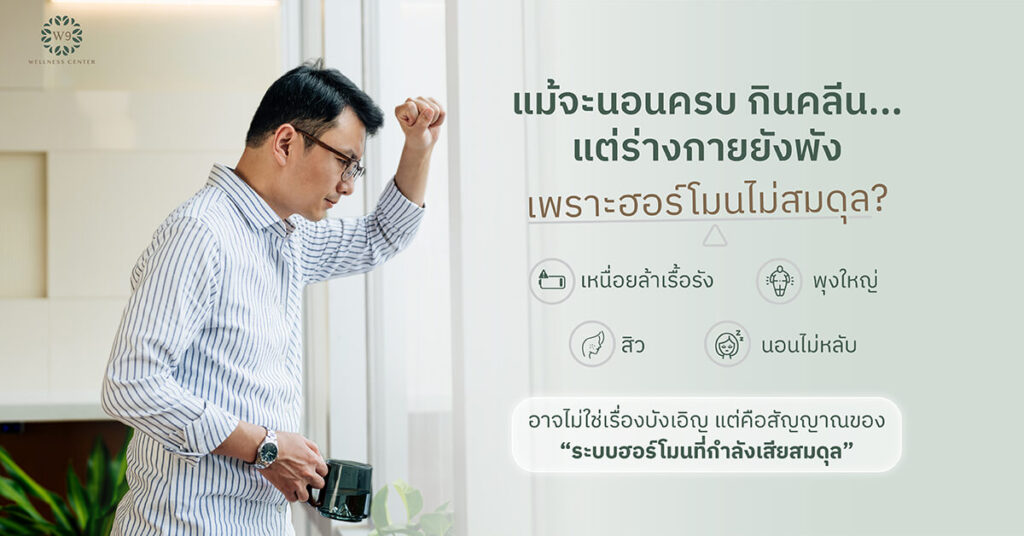
Have you ever felt that even though you get enough sleep, exercise, and eat clean, your body still isn't as vibrant as it should be?
Some days your mind is foggy, some days you get tired easily, as if your body is sending you signals that you haven't quite figured out yet. But did you know that one of the main causes that is often overlooked is "chronic hormonal imbalance," a problem we're increasingly encountering in both men and women, especially when there's accumulated stress, insufficient rest, or eating foods that aren't appropriate for your body? And one of the most powerful ways to restore this balance is... Foods that suit each person's hormones: Hormone Balance Diet
Our bodies have more than 50 hormones that control everything from energy, sleep, metabolism, to mood and reproduction. Hormones work in a network, and if one is out of balance, it can cause other hormones to imbalance.
Hormonal imbalances commonly found in Thai people today include:
| hormone | Main duties | Common warning signs |
| cortisol | stress hormones | Insomnia, waking up feeling unrefreshed, having a big belly, having a blurry mind, having a low immune system, and having less energy. |
| insulin | Control blood sugar levels | Easily gain weight, crave sweets, and are often hungry after meals. |
| Estrogen/progesterone | Menstrual cycle, skin | Irregular menstruation, acne on the chin or jaw, migraine headaches during menstruation |
| thyroid | Metabolism and energy | Easily tired, easily cold, dry skin, rapid weight gain or loss |
| Melatonin | Control the biological clock | Difficulty falling asleep, not sleeping deeply, feeling sleepy during the day |
Hormone Balance Diet is a nutritional approach designed to: Restore the hormonal system to function in balance. The main principles are:
It is different from the usual “calorie control” or “clean eating” because the goal of this approach is: Restoring your body's internal balance isn't just about losing weight.
avoid: Afternoon coffee, processed foods, sugar
Should add: Magnesium (bananas, spinach), B-complex vitamins, good fats (fish, avocado)
Tips: Drink warm Golden Milk (almond milk + turmeric) before bed to help reduce cortisol.
avoid: Sugar, white rice, refined flour
Should add: Clean protein, colorful vegetables, riceberry, unpolished grains
Tips: Walk for 10–15 minutes after a meal to help control blood sugar.
avoid: Cow's milk, bakery, processed vegetable oil
Should add: Broccoli, cauliflower, black sesame, flaxseed
Tips: Drinking warm water in the morning helps stimulate the excretion of hormone residues through the bile system.
avoid: Raw cabbage, peanuts, raw soybeans (Goitrogens)
Should add: Iodine (seaweed), selenium (Brazil nuts), iron (liver, organic red meat)
Tips: Go to bed before 10 PM and get some morning sunlight to stimulate TSH production.
| Principle | result |
| Eat enough protein | Create hormones, maintain blood sugar levels, increase satiety |
| Increase fiber from vegetables and grains | Helps the intestines, reduces excess hormones, balances estrogen |
| Choose good fats | Supports the production of sex hormones, reduces inflammation, and improves skin's ability to retain water. |
| Avoid sugar | Reduce insulin resistance, reduce accumulated fat |
| Avoid trans fats and processed foods. | Reduce chronic inflammation that affects hormones |
| Maintain intestinal balance | Healthy gut = balanced hormones |
| Drink enough water | Helps the waste removal system and hormone circulation. |
If you have these symptoms…your body may be telling you that your hormones are out of balance.
If you meet two or more criteria
That is a sign that Your hormonal system may need some attention.
Hormone Balance Diet is a deep-rooted solution for your body, helping you…🔥 Stimulate metabolism and better control weight
😴 Deep sleep, sound sleep Wake up refreshed
😌 The mood is calmer. Reduce stress, feel less irritated
🌿 Reduce acne, improve skin From the excretion of excess hormones
💪 Restore sex hormone balance Helps with menstrual cycles, infertility, or potency.
🧠 Increase energy, improve brain function Have the strength to work and live
❤️ Reduce the risk of chronic disease Such as diabetes, breast cancer, prostate cancer
at W9 Wellness Center We focus on personalized health care, starting with “truly understanding your body.”
Good health begins with “inner balance,” and one of the most important keys to this balance is “hormones.” Listen to your body more and choose what works for you each day. If you want to truly plan your diet to meet your body's needs, we recommend consulting a Functional Medicine specialist.
Praram 9 Hospital (3rd floor, Building A)
Dr. Phattharalada Ritthiwong (Dr. Ice)
Anti-aging and preventative medicine physician
W9 Wellness Center
Many people have probably heard of Baby Blues.
“Young Coconut” is considered a fruit that is easily found in Thailand. If we look closely, young coconuts are often used as a symbol of freshness in the summer.